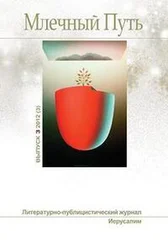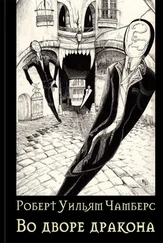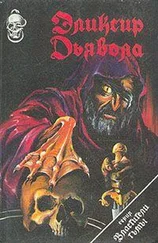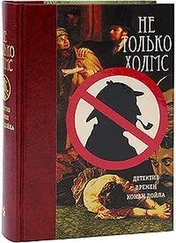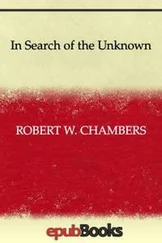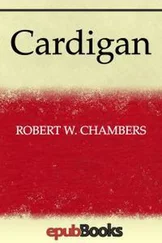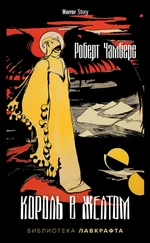"I'd rather eat vermilion paint on my salad than sit here talking to you !" he shouted.
I cast a pitying glance at this impossible man, and went into the house. After all, he was her father. I had to endure him.
* * * * *
After Miss Blythe had carried to her father a large bucket of lettuce leaves, she returned to the veranda of the bungalow.
"Miss Blythe had carried to her father a large bucket of lettuce leaves."
A delightful luncheon awaited us; I seated her, then took the chair opposite.
A delicious omelette, fresh biscuit, salad, and strawberry preserves, and a tall tumbler of iced tea imbued me with a sort of mild exhilaration.
Out of the corner of my eye I could see Blythe down in the garden, munching his lettuce leaves like an ill–tempered rabbit, and daubing away at his picture while he munched.
"Your father," said I politely, "is something of a genius."
"I am so glad you think so," she said gratefully. "But don't tell him so. He has been surfeited with praise in Boston. That is why we came out here."
"Art," said I, "is like science, or tobacco, or tooth–wash. Every man to his own brand. Personally, I don't care for his kind. But who can say which is the best kind of anything? Only the consumer. Your father is his own consumer. He is the best judge of what he likes. And that is the only true test of art, or anything else."
"How delightfully you reason!" she said. "How logically, how generously!"
"Reason is the handmaid of Science, Miss Blythe."
She seemed to understand me. Her quick intelligence surprised me, because I myself was not perfectly sure whether I had emitted piffle or an epigram.
As we ate our strawberry preserves we discussed ways and means of capturing a specimen of the little fire creatures which, as she explained, so frequently peeped out at her from the crater fires, and, at her slightest movement, scurried back again into the flames. Of course I believed that this was only her imagination. Yet, for years I had entertained a theory that fire supported certain unknown forms of life.
"I have long believed," said I, "that fire is inhabited by living organisms which require the elements and temperature of active combustion for their existence—microörganisms, but not," I added smilingly, "any higher type of life."
"In the fireplace," she ventured diffidently, "I sometimes see curious things—dragons and snakes and creatures of grotesque and peculiar shapes."
I smiled indulgently, charmed by this innocently offered contribution to science. Then she rose, and I rose and took her hand in mine, and we wandered over the grass toward the crater, while I explained to her the difference between what we imagine we see in the glowing coals of a grate fire and my own theory that fire is the abode of living animalculae.
On the grassy edge of the crater we paused and looked down the slope, where the circle of steam rose, partly veiling the pale flash of fire underneath.
"How near can we go?" I inquired.
"Quite near. Come; I'll guide you."
Leading me by the hand, she stepped over the brink and we began to descend the easy grass slope together.
There was no difficulty about it at all. Down we went, nearer and nearer to the wall of steam, until at last, when but fifteen feet away from it, I felt the heat from the flames which sparkled below the wall of vapour.
Here we seated ourselves upon the grass, and I knitted my brows and fixed my eyes upon this curious phenomenon, striving to discover some reason for it.
Except for the vapour and the fires, there was nothing whatever volcanic about this spectacle, or in the surroundings.
From where I sat I could see that the bed of fire which encircled the crater; and the wall of vapour which crowned the flames, were about three hundred feet wide. Of course this barrier was absolutely impassable. There was no way of getting through it into the bottom of the crater.
A slight pressure from Miss Blythe's fingers engaged my attention; I turned toward her, and she said:
"There is one more thing about which I have not told you. I feel a little guilty, because that is the real reason I asked you to come here."
"What is it?"
"I think there are emeralds on the floor of that crater."
"Emeralds!"
"I think so." She felt in the ruffled pocket of her apron, drew out a fragment of mineral, and passed it to me.
I screwed a jeweler's glass into my eye and examined it in astonished silence. It was an emerald; a fine, large, immensely valuable stone, if my experience counted for anything. One side of it was thickly coated with vermilion paint.
"Where did this come from?" I asked in an agitated voice.
"From the floor of the crater. Is it really an emerald?"
I lifted my head and stared at the girl incredulously.
"It happened this way," she said excitedly. "Father was painting a picture up there by the edge of the crater. He left his palette on the grass to go to the bungalow for some more tubes of colour. While he was in the house, hunting for the colours which he wanted, I stepped out on the veranda, and I saw some crows alight near the palette and begin to stalk about in the grass. One bird walked right over his wet palette; I stepped out and waved my sun–bonnet to frighten him off, but he had both feet in a sticky mass of Chinese vermilion, and for a moment was unable to free himself.
"I almost caught him, but he flapped away over the edge of the crater, high above the wall of vapour, sailed down onto the crater floor, and alighted.
"But his feet bothered him; he kept hopping about on the bottom of the crater, half running, half flying; and finally he took wing and rose up over the hill.
"As he flew above me, and while I was looking up at his vermilion feet, something dropped from his claws and nearly struck me. It was that emerald."
When I had recovered sufficient composure to speak steadily, I took her beautiful little hand in mine.
"This," said I, "is the most exciting locality I have ever visited for purposes of scientific research. Within this crater may lie millions of value in emeralds. You are probably, today, the wealthiest heiress upon the face of the globe!"
I gave her a winning glance. She smiled, shyly, and blushingly withdrew her hand.
For several exquisite minutes I sat there beside her in a sort of heavenly trance. How beautiful she was! How engaging—how sweet—how modestly appreciative of the man beside her, who had little beside his scientific learning, his fame, and a kind heart to appeal to such youth and loveliness as hers!
There was something about her that delicately appealed to me. Sometimes I pondered what this might be; sometimes I wondered how many emeralds lay on that floor of sandy gravel below us.
Yes, I loved her. I realised it now. I could even endure her father for her sake. I should make a good husband. I was quite certain of that.
I turned and gazed upon her, meltingly. But I did not wish to startle her, so I remained silent, permitting the chaste language of my eyes to interpret for her what my lips had not yet murmured. It was a brief but beautiful moment in my life.
"The way to do," said I, "is to trap several dozen crows, smear their feet with glue, tie a ball of Indian twine to the ankle of every bird, then liberate them. Some are certain to fly into the crater and try to scrape the glue off in the sand. Then," I added, triumphantly, "all we have to do is to haul in our birds and detach the wealth of Midas from their sticky claws!"
"That is an excellent suggestion," she said gratefully, "but I can do that after you have gone. All I wanted you to tell me was whether the stone is a genuine emerald."
I gazed at her blankly.
Читать дальше

